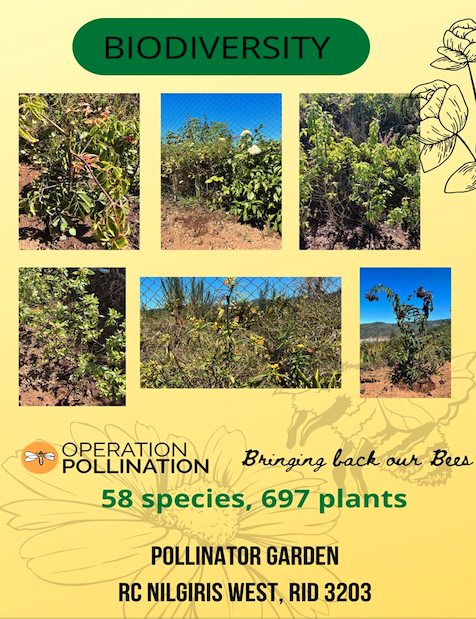Pollinator Park in Nilgiris
A two acre area was planted with native and non native pollinator friendly plants to offer the public a chance to see the biodiversity of pollinators.

Location/Club: Rotary Club of Nilgiris West, District 3203, Tamilnadu, India
A two acre area was planted with native and non native pollinator friendly plants to offer the public a chance to see the biodiversity of pollinators. The planting and the variety of plants to attract not only butterflies but also the majority of pollinators are seen as tools to engage the local community.This region has three of the bee species which are honey producers and there have been swarming seen. Showing the different areas that these bees tend to swarm to has also given the school children to realize there are different pollinator species. We are awaiting funds to make this park more interactive. We are also in the process of setting up bee hotels to see the diversity of solitary bee species.
The Nilgiris Biosphere Reserve consists of tiger reserves, habitations and vast areas of tea plantations. With vagaries in tea prices, smaller tea plantations are being converted into agriculture for monocultures again of carrots, cabbage and cauliflower. There are intermittent corridors of tropical montane forests in between all this which have highly endemic flora as well as fauna, especially, insects. With increasing pressure of agriculture there has been a rise in pesticide use.
To draw attention to the growing pesticide use especially in the vegetable farms our club members decided to start a pollinator park to introduce pollinators to the local population as an awareness campaign. Once the park is ready, we plan on getting each government school in the vicinity to send their children free of cost.
Our club member Rtn. Geetha Srinivasan let us use her property which is surrounded by tea estates as well as vegetable farms to lay out this park. We used 350 sq m of her property. The land was cleared using volunteers and hired labour. Plants were sourced from the Foundation of Revitalisation of Local Health Traditions, and helped by Dr. Chaithrika Hegde, the park was designed with 53 species of plants and 690 individual saplings.
The planting was done starting from March 2021 to March 2022 and will be a continuing project. Due to COVID restrictions and very heavy rains we have not yet done a pollinator count nor opened it to the public yet. We plan on doing this in August 2022. This has again been postponed due to a very wet year.
The idea of this park is to slowly start increasing local montane grass species in the next phase so it shows the biodiversity of plant species plus the pollinators around. We are setting smaller parks around so it forms a corridor. The region is mainly a mosaic of tea plantations and vegetable fields. Commercial vegetable crops like carrots and crucifers require high level of pesticide use and this affect the solitary bee population. We are using this park as the demo plot as we are getting farmers to start looking at floral corridors to act as pollinator reservoirs. Two very rainy years have prevented any expansion to this project.
Total cost of the project $4000 (including school visits). Project is part of the RC of Nilgiris West, RID 3203 commitment to Environment as well as ESRAG contribution to club projects.
